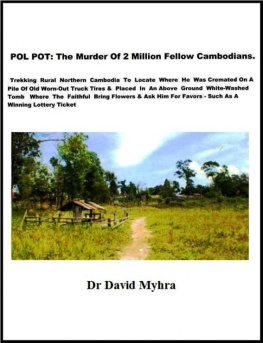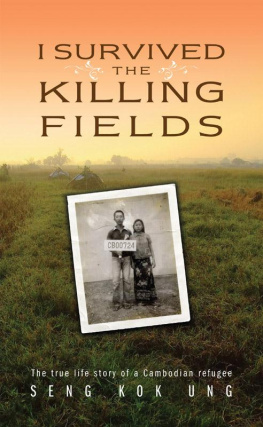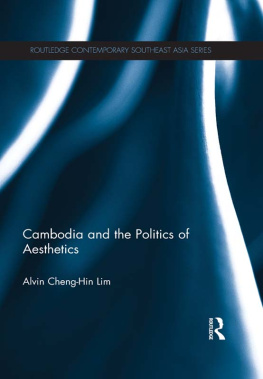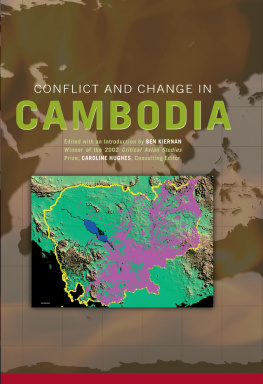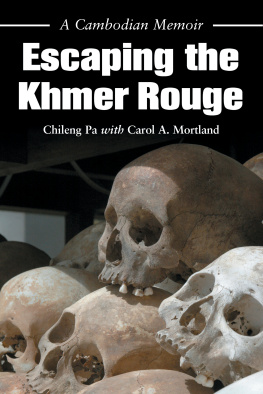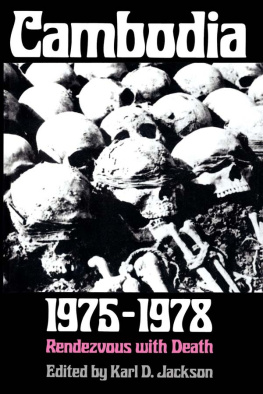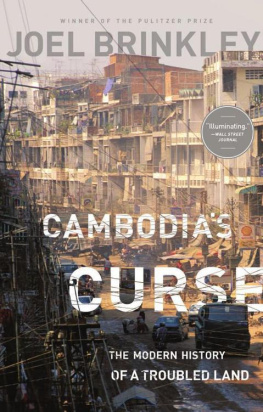Why Did They Kill?
CALIFORNIA SERIES IN PUBLIC ANTHROPOLOGY
The California Series in Public Anthropology emphasizes the anthropologists role as an engaged intellectual. It continues anthropologys commitment to being an ethnographic witness, to describing, in human terms, how life is lived beyond the borders of many readers experiences. But it also adds a commitment, through ethnography, to reframing the terms of public debatetransforming received, accepted understandings of social issues with new insights, new framings.
Series Editor: Robert Borofsky (Hawaii Pacific University)
Contributing Editors: Philippe Bourgois (UC San Francisco), Paul Farmer (Partners in Health), Rayna Rapp (New York University), and Nancy Scheper-Hughes (UC Berkeley)
University of California Press Editor: Naomi Schneider
1. Twice Dead: Organ Transplants and the Reinvention of Death, by Margaret Lock
2. Birthing the Nation: Strategies of Palestinian Women in Israel, by Rhoda Ann Kanaaneh (with a foreword by Hanan Ashrawi)
3. Annihilating Difference: The Anthropology of Genocide, edited by Alexander Laban Hinton (with a foreword by Kenneth Roth)
4. Pathologies of Power: Health, Human Rights, and the New War on the Poor, by Paul Farmer (with a foreword by Amartya Sen)
5. Buddha Is Hiding: Refugees, Citizenship, the New America, by Aihwa Ong
6. Chechnya: Life in a War-Torn Society, by Valery Tishkov (with a foreword by Mikhail S. Gorbachev)
7. Total Confinement: Madness and Reason in the Maximum Security Prison, by Lorna A. Rhodes
8. Paradise in Ashes: A Guatemalan Journey of Courage, Terror, and Hope, by Beatriz Manz (with a foreword by Aryeh Neier)
9. Laughter Out of Place: Race, Class, Violence, and Sexuality in a Rio Shantytown, by Donna M. Goldstein
10. Shadows of War: Violence, Power, and International Profiteering in the Twenty-First Century, by Carolyn Nordstrom
11. Why Did They Kill? Cambodia in the Shadow of Genocide, by Alexander Laban Hinton (with a foreword by Robert Jay Lifton)
12. Yanomami: The Fierce Controversy and What We Can Learn from It, by Robert Borofsky
13. Why Americas Top Pundits Are Wrong about the World, edited by Catherine Besteman and Hugh Gusterson
Why Did They Kill?
Cambodia in the Shadow of Genocide
Alexander Laban Hinton

were redrawn from versions that appeared in The Tragedy of Cambodian History: Politics, War, and Revolution since 1945, by David P. Chandler (Yale University Press, 1991). The Note on Transliteration on p. 299 appeared originally in Cambodian Culture since 1975: Homeland and Exile, edited by May M. Ebihara, Carol A. Mortland, and Judy Ledgerwood (Cornell University Press, 1994).
University of California Press
Berkeley and Los Angeles, California
University of California Press, Ltd.
London, England
2005 by the Regents of the University of California
Library of Congress Cataloging-in-Publication Data
Hinton, Alexander Laban.
Why did they kill? : Cambodia in the shadow of genocide / Alexander Laban Hinton.
p. cm. (California series in public anthropology ; 11)
Includes bibliographical references and index.
ISBN 0-520-24178-9 (cloth : alk. paper).ISBN 0-520-24179-7 (pbk. : alk. paper)
1. CambodiaPolitics and government19751979. 2. Political atrocitiesCambodia. 3. GenocideCambodia. I. Title. II. Series.
DS554.8.H56 2005
959.604'2dc22 2005009189
Manufactured in the United States of America
13 12 11 10 09 08 07 06 05 04
10 9 8 7 6 5 4 3 2 1
Printed on Ecobook 50 containing a minimum 50% post-consumer waste, processed chlorine free. The balance contains virgin pulp, including 25% Forest Stewardship Council Certified for no old growth tree cutting, processed either TCF or ECF. The sheet is acid-free and meets the minimum requirements of ANSI/NISO Z39.48-1992 (R 1997) (Permanence of Paper).
For Nicole, Meridian, and Arcadia
Thank you for the light
Contents
Figures
Acknowledgments
This project would never have been possible without the help of a number of people and institutions. Enormous thanks go to Bradd Shore, my doctoral advisor in the Department of Anthropology at Emory University, for his support, encouragement, and critical insights about this project. He was extremely generous with his time, even when he was the department chair. The other members of my doctoral committeeMay Ebihara, Charles Nuckolls, Robert Paul, and Carol Worthmanwere similarly helpful, providing many excellent comments and suggestions that have helped shape the project into its current form. Fredrik Barth has been an inspiration and provided valuable feedback about this book. Finally, I want to thank Emorys anthropology department for creating a supportive and dynamic environment in which to undertake doctoral studies.
I am fortunate to have found a similarly stimulating atmosphere in the Department of Sociology and Anthropology at Rutgers University, Newark, where I have been a faculty member since 1998. The chair of the department, Clay Hartjen, has been wonderful, as have my other colleagues, Sherri-Anne Butterfield, Anne-Marie Cantwell, Ira Cohen, Brian Ferguson, Carol Henderson, Max Herman, Kurt Schock, and Janet Siskind. In particular, I have benefited from many conversations with Brian about violence and war. I have also enjoyed working in the Center for Global Change and Governance and would like to express my appreciation to the directors of the center, Richard Langhorne, Yale Ferguson, and Alex Moytl. Finally, I would like to thank my students at Rutgers for their engagement with issues and ideas related to this book.
I would also like to acknowledge the grants and fellowships that various institutions provided for my graduate education, fieldwork, and postdoctoral studies. My doctoral research was funded by a National Institute of Health NRSA Fellowship, a National Science Foundation Graduate Fellowship, a National Science Foundation Doctoral Dissertation Grant, an Institute for the Study of World Politics Scholarship, two Association for Asian Studies Southeast Asia Council Small Grants for Isolated Southeast Asia Scholars, an Emory University Doctoral Fellowship, and a grant from the Joint Committee on Southeast Asia of the Social Science Research Council and the American Council of Learned Societies with funds provided by the Andrew W. Mellon Foundation, the Ford Foundation, and the Henry Luce Foundation. Language training at the 1991, 1992, and 1993 Southeast Asia Summer Studies Institute was supported by Foreign Language Area Studies Scholarships. I am grateful to the Committee on Human Development at the University of Chicago for offering me a stimulating environment and a NIH Post-Doctoral Fellowship during the 199798 academic year. Two Rutgers University Research Council Grants provided funding that enabled me to return to Cambodia for follow-up research in the summers of 2000 and 2003. Finally, I would like to thank Rob Lemelson and the Foundation for Psycho-Cultural Research for awarding me a Book Writing Fellowship that enabled me to spend a semester completing the revisions to this manuscript in the fall of 2002.
My work would not have been possible without the assistance of various Cambodians and Cambodian institutions. During my 199495 doctoral research, the Ministry of Culture in Phnom Penh helped me to procure research approval to work in Kompong Cham and at Tuol Sleng. My thanks also go to the provincial government of Kompong Cham, which facilitated my research, and to the many schoolmasters, teachers, students, and officials who allowed me to videotape their classes and schools. I owe a great debt to the people of Banyan, the village where I conducted much of my research, for their time and assistance. Without their openness, patience, and compassion, this study would not have been possible. I want to thank my many informants from Banyan, Kompong Cham, and Phnom Penhas well as my research assistantsfor their help. I am grateful to Kurt Bredenberg and Seng Vanna for their friendship during my stay in Cambodia and for their help with my work. Thanks also to Phalla and Doung. When I returned to Cambodia in 2000 and 2003, Youk Chhang and his staff at the Documentation Center of Cambodia (DC-Cam), especially Vannak Huy, were extremely helpful, providing me with research space and ready access to key DK documents from the amazing archive they have assembled. My deepest thanks to Youk for his hospitality and help, which has continued since I returned from the field, and for his comments on this book.



